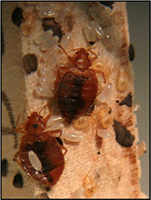 by David Moore
by David Moore
Manager of Technical Services and Board Certified Entomologist
with contributions by Eric Smith, PhD, BCE
Summer is nearly upon us, and you know what that means? It’s time for fun in the sun with the family—Vacation Time! However, in order to travel safely we will need to prepare ourselves: sunscreen-check, sunglasses-check, water wings-check, and how to prevent taking home bed bugs. Let’s see what we can do about only taking home memories and how to check for bed bugs when traveling.
Bed bugs do not discriminate the type of hotel they stay at and with more and more reports of bed bugs popping up all over the world, we need to ensure you are an informed traveler to reduce the likelihood of bringing bed bugs home.
What do bed bugs look like?
Bed bugs are wingless blood feeders that are a reddish-brown color and about the size of Lincoln’s head on a penny. The eggs and nymphs can be as small as 1 mm and have about the same color and consistency of fishing line. They are great hitchhikers and will gladly take a ride in your belongings to visit your home.
First step, check the internet for repetitive issues at the same hotel. This may be indicative of a broader issue that is not being addressed properly.
What should we be looking for as signs of bed bugs in a room?
The most obvious sign is seeing live bed bugs. The next obvious sign is finding blood spotting on items in the room, particularly on the sheets or bed skirt. Other signs include finding dead bed bugs, molted skins, eggs, and in severe cases there is a faint musty odor that can be smelled. Waking up with “bites” can be a cause for concern, but not all marks are bed bug bites. Individual’s reactions to bed bug bites vary greatly from no reaction to red streaks to itchy bumps, but you must take marks as a sign of infestation with a grain of salt.
We want you to enjoy your time on your vacation, so we will only focus on some of the top areas bed bugs are found. First things first, you did pack a flashlight – Great! You will need it when looking at some of these areas. Also, remember to not unpack until you have inspected the room. If you can remove the headboard safely without damaging anything, check behind it for signs of bed bugs. This is a very common area bed bugs are found since it is very rarely disturbed and it gives very quick access to their snack (us). The next area we will be looking is on the bed itself. You need to be lifting up the sheets and looking at the mattress seams, the corner protectors, and the bed skirt. Check the joints of the luggage rack. Make sure you are checking all the accessible sides of the couch/chair, night stand, and dresser as well. There are many other places that bed bugs can live, but those are the most common areas.
So what else can we do in a hotel room?
- Do not leave your suitcases on the bed or sofa.
- Try not to unpack as much of your luggage as possible.
- If you can, leave your luggage in the bathroom. This is one of the least likely areas that bed bugs will live. You can also have sealable plastic bags around your luggage and your belongings to help reduce taking them home with you.
Please keep in mind that the hotel is most likely not aware that there may be bed bugs in your room. Many chains are now implementing proactive bed bug procedures in order to help protect their guests, but because of the nature of the pest they can still be introduced very easily. They want everyone to enjoy their time at their property and go home with just their families and souvenirs.
So you got home and are getting ready to unpack
Let’s still be proactive against any potential issues:
- If possible, do not bring the luggage into the home right away.
- Take your laundry out of the luggage and place it directly into the washer machine or dryer. Bed beds will not survive in temperatures above 120 degrees, and soapy water will kill them as well.
- Dry cleaning will kill bed bugs if clothing requirements deem that necessary.
- If you can vacuum the luggage on the interior and exterior, this will help reduce the potential for a bed bug introduction to your home as well.
If you do find bed bugs in your belongings
- Remove the item(s) from your property immediately. Getting rid of a piece of luggage is typically going to be much cheaper than a treatment for your home.
- Notifying the hotel where you stayed will help reduce the spread of bed bugs to other people. If you are concerned that they may have gotten out of your luggage in either your home or your car, I would suggest calling a pest management professional to inspect those areas accordingly.
- If you can have a canine inspection for your belongings, home, and car, I would suggest investing the money in that type of inspection. The canine will sense things that a typical inspector cannot see. Since bed bugs are so cryptic, their populations can grow unknown to anyone for quite some time before any action is taken.
If bed bugs are discovered
Please take the time to hire a pest management professional. Problems like this do not go away, they only get worse. Many people waste time and give themselves and family members (pets included) unnecessary exposure to pesticides because they want to try to treat their home themselves. A reputable pest management professional will be able to give you the best treatment options for your situation and resolve it in the safest manner.
